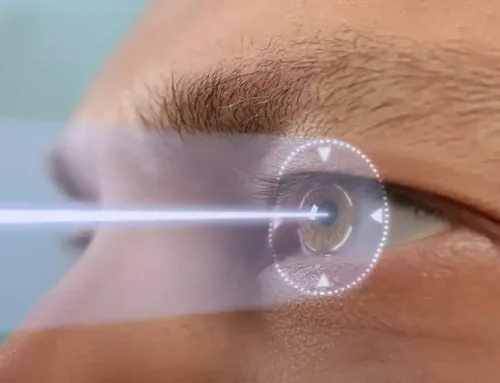Laser Eye Surgery procedures, like LASIK, have helped millions of patients around the world. However, they are not right for everyone. In this article we’ll provide a comprehensive guide about “Who Should Not Have Laser Eye Surgery?”
LASIK is the most popular Laser Eye Surgery, so we’ll spend most of our time focused on it. Specifically, we’ll cover what LASIK is, how it works, why some people shouldn’t have it, and who shouldn’t have it.
What is LASIK?
LASIK (Laser-Assisted In Situ Keratomileusis) is a popular laser vision correction procedure aimed at correcting common vision problems such as myopia (nearsightedness), hyperopia (farsightedness), and astigmatism.
By reshaping the cornea—the clear front part of the eye—LASIK enables light entering the eye to be properly focused onto the retina, thereby improving vision. The procedure has gained immense popularity due to its effectiveness and the relatively quick recovery time, offering many people the possibility of reducing or eliminating their reliance on glasses or contact lenses.
How Does LASIK Work?
The LASIK procedure involves several steps:
- Creating a Corneal Flap: A thin flap is created in the cornea, most commonly with a femtosecond laser. This flap is gently lifted to expose the underlying corneal tissue.
- Reshaping the Cornea: An excimer laser is used to remove a predetermined amount of corneal tissue, reshaping the cornea to correct the refractive error. The laser uses ultraviolet light beams to precisely remove microscopic amounts of tissue.
- Repositioning the Flap: After the cornea has been reshaped, the corneal flap is carefully placed back into its original position. It naturally adheres without the need for stitches, allowing it to heal over time.
The entire process typically takes about 15 minutes per eye, and patients often notice an improvement in vision within 24 hours.
Why Should Some Patients Not Have LASIK?
While LASIK can be a life-changing procedure for many, it is not suitable for everyone.
For some patients who are LASIK candidates, there may simply be an even better procedure. Modern Vision Correction is more than just LASIK. Procedures like EVO ICL, PRK, and Custom Lens Replacement may be better options.
In other patients, LASIK may be an option, but at a later date. For example, generally surgeons wait for patients to turn 18 before having LASIK. This is because most individuals’ prescription is stable by then. However, if a 20 year-old comes in, who reports that their prescription has been changing over the past 6 months, the surgeon may instruct the patient to wait for stability. The goal is to get long-lasting results.
Finally, in some patients LASIK simply poses too much risk. In the next section we’ll review a number of specific reasons that patients may be determined to be poor candidates for LASIK.
Who Should Not Have Laser Eye Surgery?
In 2022, the American Academy of Ophthalmology published its Preferred Practice Patterns for Refractive Surgery. Leading surgeons from across the country came together to create these guidelines. These are the groups of patients they advised should not have LASIK.
Unstable Prescription
Patients with an unstable prescription, meaning their vision has changed significantly within the last year, are generally advised against LASIK. Stability in prescription is crucial for ensuring the long-term success of the procedure. Frequent changes in vision can indicate underlying issues that might need to be addressed before considering LASIK. These patients may be good candidates for LASIK in the future.
Corneal Abnormalities
Conditions like keratoconus or other forms of corneal ectasia, where the cornea is thin and bulges outward, can be problematic for LASIK. These abnormalities can compromise the structural integrity of the cornea, making it unsafe to undergo the procedure.
Insufficient Corneal Thickness
LASIK involves the removal of some corneal tissue to reshape it. If a patient has insufficient corneal thickness, there may not be enough tissue to safely perform the procedure. This can increase the risk of complications such as ectasia, where the cornea becomes too weak and begins to bulge or warp its shape over time.
Visually Significant Cataract
Patients with cataracts, a condition where the lens of the eye becomes cloudy, should not undergo LASIK. Cataracts significantly affect vision, and treating the cataract (usually with cataract surgery) should take precedence. LASIK does not address the clouding of the lens caused by cataracts and is not effective in improving vision in such cases. Lens implants can be used during cataract surgery to fix most patients’ prescription and provide freedom from glasses similar to LASIK.
Uncontrolled Glaucoma
Glaucoma, characterized by increased intraocular pressure that can damage the optic nerve, needs to be well-controlled before considering LASIK.
Uncontrolled External Disease
External eye diseases such as severe dry eye, blepharitis, or conjunctivitis should be managed before LASIK can be considered. These conditions can interfere with healing and increase the risk of post-surgical complications.
Uncontrolled Autoimmune Disease
Autoimmune diseases, like rheumatoid arthritis or lupus, can affect the body’s healing response. Patients with these conditions need thorough evaluation and possibly alternative treatments as their immune system might not respond well to the surgical healing process required after LASIK.
Patients whose autoimmune disease is well-controlled may be candidates for LASIK.
Uncontrolled Mental Illness
Mental health conditions, such as severe depression or anxiety disorders, should be stabilized before undergoing elective surgery like LASIK. These conditions can affect a patient’s ability to understand the risks and benefits of the procedure and adhere to post-operative care instructions.
Conclusion
LASIK is a powerful tool for vision correction, offering many people the chance to reduce or eliminate their dependence on corrective lenses. However, it is not suitable for everyone. Individuals with unstable prescriptions, corneal abnormalities, insufficient corneal thickness, visually significant cataracts, uncontrolled glaucoma, external diseases, autoimmune diseases, or mental health issues should carefully consider these factors and consult with their eye care professional. Proper evaluation and a personalized approach are essential to ensure the best outcomes and minimize risks associated with the procedure.
By understanding who should not have LASIK, patients can make informed decisions about their eye health and explore other vision correction options if LASIK is not appropriate for them. Always consult with a qualified ophthalmologist to determine the best course of action for your specific condition.







